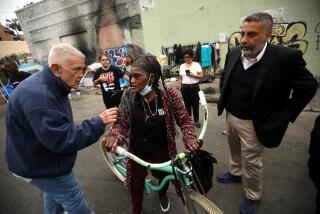Jury Hardship Cases Given a Closer Look in Kraft Trial
- Share via
The judge in Randy Steven Kraft’s murder trial has been fattening the jury pool this week, over objections by Kraft’s attorneys, by bringing back many county residents who thought they had been excused last week when they claimed hardships.
About 300 people essentially answered yes last week to Superior Court Judge Donald A. McCartin’s questionnaire asking whether they could sit on a trial that could take at least a year. Another 1,400, however, answered no, saying it would be a hardship to sit on a case that long.
But the way McCartin sees it, too many of the negative answers were vague. So this week, in a process scheduled to end today, the judge has called back about 200 people. One at a time, they have appeared on the witness stand to explain further.
Individual Questions on Death Penalty
The result is that about a third of those re-questioned so far have been returned to the jury pool for now. The next step is for them to be individually questioned, along with the other 300 potential jurors, on the death penalty by the judge and the attorneys, beginning Aug. 10.
Kraft, now 43, from Long Beach, is charged with 16 murders in Orange County. Prosecutors also plan to use as evidence in his trial details from another 21 slayings with which Kraft has been linked.
It is expected to be the longest trial in the county’s history. The victims were all young men, with most 18 to 25 years old.
Kraft’s attorneys are worried that the length of the trial will eliminate a good cross section of the community from sitting on the jury. And they are not pleased with McCartin’s questionnaire process in finding a pool of prospective jurors.
“Our contention is that these hardship questions should have been asked in greater detail originally,” Kraft attorney C. Thomas McDonald said. “These people would not have to be called back again if we had done that.”
Because he objects to the process, McDonald has refused to ask a single question of any of the people the judge has brought back to question this week. But Deputy Dist. Atty. Bryan F. Brown has questioned them, along with McCartin.
‘No Problem Finding a Fair Jury’
“I think this is a great idea,” Brown said. “After adding this many more people to the jury pool, we should have no problem finding a fair jury for this trial.”
Some prospects brought back were excused after they explained they had prepaid vacation plans.
The judge Wednesday excused a Roman Catholic nun. He excused a man who is a homicide prosecutor whose supervisor is Brown.
One woman thought she would be excused because she is a longtime friend of the Kraft family. While both sides recognize that she will never be called to sit as an unbiased juror, she was put back into the jury pool because she could not show that the trial’s length would present a hardship for her.
The judge agreed Thursday to excuse a man whose work would require him to be out of state much of the year. A firefighter was excused for work reasons. But a social worker was put back into the jury pool because further questioning showed that the hardship would be on her employer, not on her.
One man put back into the jury pool had answered that he had a brother-in-law recently slain. The judge found that was not a legal hardship reason.
A pharmacist was restored to the jury pool. Last week he had erroneously assumed his employer would not pay him if he sat in a trial a year long; he found out later that he had been wrong.
Most of those the judge restored to the jury pool were people who could not adequately show that their employers would not pay them during the time they were gone from work.
Essentially, a resident may claim a legal hardship only if the length of a trial would be a financial burden, for child-care reasons, if they are in poor health or if their services are essential to the health and safety of the community.
Brown’s contention is that the county is large enough to provide an adequate pool from which to pick 20 jurors--12 regulars and 8 alternates.
Kraft’s attorneys said that the length of the trial skews the system against their client, that the only people who can sit on a trial that long will be elderly people or government workers and that low-income people or wage earners will be primarily excluded.
Brown disagreed.
“What we’re finding out is that just tons of companies list as ‘unlimited’ the number of days they will pay an employee who is sitting on a jury,” Brown said. “It’s not going to be difficult at all to find a good cross section of the community.”
Kraft’s attorneys are still trying to halt the trial on another front. They asked the state Supreme Court on Thursday to overturn McCartin’s ruling that the Kraft case remain the subject of a single trial. The defense attorneys wanted it broken down into several trials, because they said the large number of murder charges in a single trial will bias the jury against Kraft.
More to Read
Sign up for Essential California
The most important California stories and recommendations in your inbox every morning.
You may occasionally receive promotional content from the Los Angeles Times.













